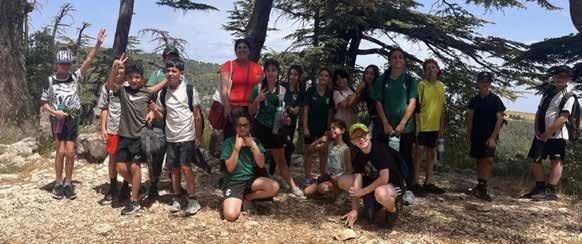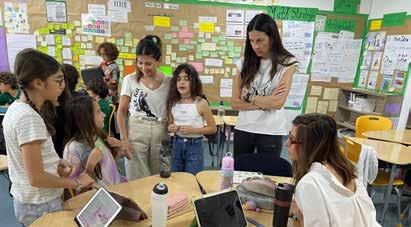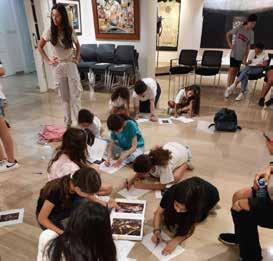
4 minute read
Grade 5 A: Tannourine Nature Reserve
Our 5th graders were excited to go on a field trip on June 9th to Tannourine to hike in its Nature Reserve which is around 1,600 meters above sea level! There, they were accompanied by a knowledgeable guide who explained the flora and fauna of such a beautiful reserve.

Students experienced many changes in emotions on that day and related them to character changes of emotions in a novel they were reading in class! They were so excited that they were inquiring outside their classroom. However, upon discovering that reaching the reserve required a two-hour trip, they were shocked and started worrying about how they would be trapped on the bus for that long. What if they had to use the bathroom during that time? Would they be able to sleep or not on the bus? When we reached the reserve, students felt so relieved that they could finally walk and run in beautiful nature.
The hike was supposed to be one hour long, yet it took around two hours since the guide had to stop at a few checkpoints to explain about the reserve and its characteristics. Students started expressing how tired they were. Finally, when they left the reserve, they were happy to reach school, and they actually explained the highlight of their visit!
They were all inspired by the Shakira Square found in the reserve. The guide explained that they named that part of the reserve after the famous singer Shakira, since every year, she visits Tannourine Nature Reserve to plant a new cedar tree there.
The students were so inspired by her action that they requested to play her songs on the bus to express admiration for her!
Parent Mentors in the PYP Exhibition
The PYP exhibition is an important milestone in a student’s educational journey. Involving parent mentors can greatly improve the fifth-grade learning experience.

The “Tuning-in Phase” prepares students to deepen their understanding of the central idea. Parent mentors supported their children by participating in conversations and discussing areas of interest. These conversations included topics such as animal abuse, sustainable cities, food waste, and the importance of sports for physical and mental health.
During the “Research Phase”, students gathered information from various sources such as books, articles, and interviews. Parent mentors supported children by facilitating the research, finding relevant resources, and conducting interviews with experts in their chosen fields. For example, the “Sports” group interviewed an expert in extreme sports and found many answers regarding the difference between individual sports and collaborative sports. During the “Sorting out Phase”, parent mentors helped children categorize information and create visual representations such as tables and mind maps. Through these discussions, mentors encouraged critical thinking and helped students connect information. For example, the “Food Waste” group visited the school cafeteria to establish a connection between the issue of food waste and how the school cafeteria is addressing this issue. In the “Going Further Phase”, students and mentors explored their issues by participating in field trips and connecting with the community.
For example, the animal abuse group interviewed a veterinarian and visited an animal shelter to learn more about this issue. In the “Conclusion Phase”, students came up with a conclusion that summed up all their learning. Parent mentors played a key role in encouraging children to reflect on the information collected and draw informed conclusions.
The PYP exhibition emphasizes taking action on real-life problems. Parent mentors guided students in developing their action plans, brainstorming possible solutions, and implementing initiatives within their communities. Encouraging student agency empowered students to create positive change in their communities. For example, the Sustainable Cities group has started raising money to create green spaces in their communities.
Collaboration between students, teachers, and parental mentors fosters a rich learning experience for students to become lifelong learners and agents of change.
Art Festival 2023
This year, the students prepared different projects for the Art Festival.
Each level worked on an art piece that was related to a unit of inquiry.
G1 & CP students worked on flower sculptures inspired by the artist Yayoi Kusama’s flower sculptures. This was in relation to the unit of inquiry Sharing the Planet.
Students of KG2 and GS worked on a big canvas that represented the story of Swimmy. This project was connected to their unit of inquiry “How We Express Ourselves” which involves stories and how they could be told. One way to tell a story is through visual text, and in the case of art, it could be through artworks. Students worked with recycled water bottles in the shape of a fish which were later painted. Then, they learned the printing technique and did drawings from the story and printed them on the big canvas.
Students of KG1 & MS worked on stick figures with body expressions as part of their unit of inquiry “How We Express Ourselves”. This is to help them understand the different forms of expression. The three figures were built with recycled water bottles, masking tape, and the paper maché technique. They were later painted and decorated in different colors.
Nursery and PS students chose to make animal sculptures in relation to Sharing the Planet. The animals’ shapes were designed and cut using wood. The students decorated the animals with paint, paper cut-outs, and mosaics.


Students made beautiful artworks and learned different techniques.
Finally, the opening of the Art Festival “IC Art” took place on Wednesday 7 June at IC Ras Beirut Campus.
Raphaella Matta AA Preschool and G1 Art Teacher
Sortie à la Fondation d’Art Dalloul

Dans le cadre de notre unité de recherche “Comment nous nous organisons”, une sortie pédagogique a été organisée pour les élèves de CM1 afin de mieux comprendre le concept de l’économie, notre responsabilité en tant que citoyens du monde ainsi que les causes et les effets de notre prise de décision (individuelle ou collective) sur les activités économiques (consommation et production).





